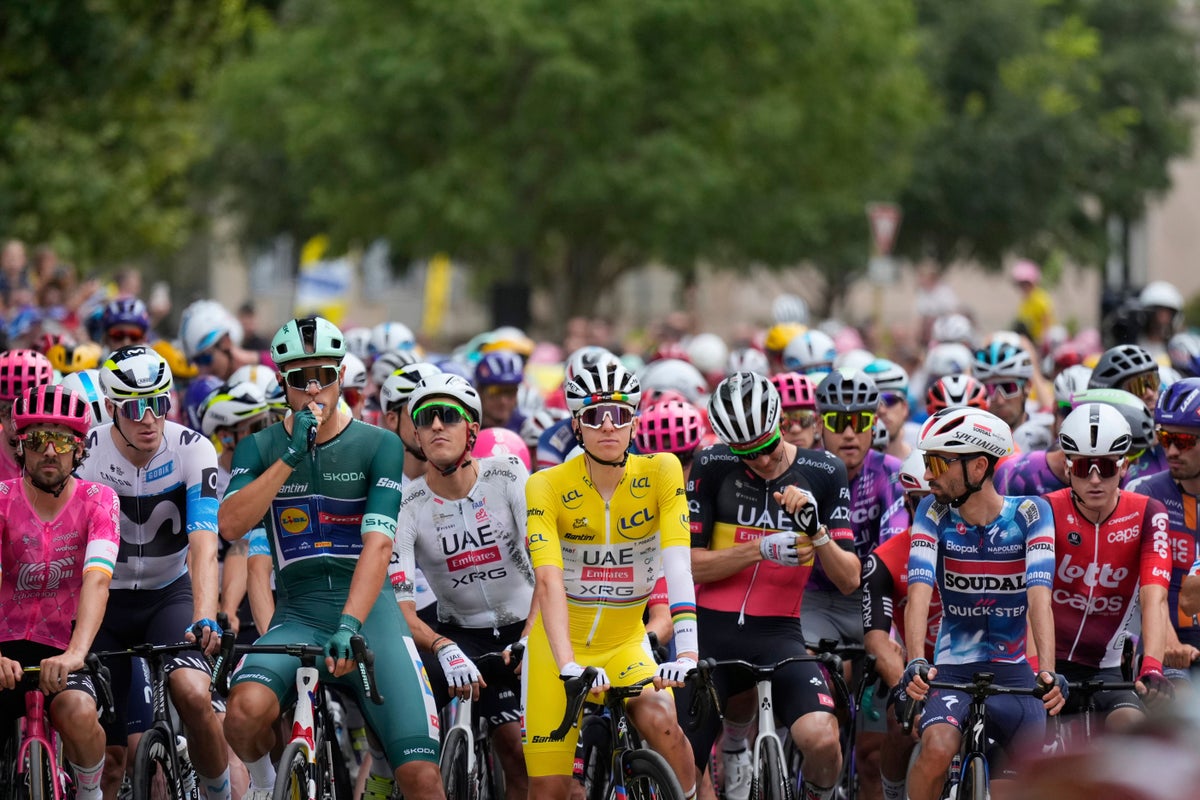F1 Belgian GP LIVE: Race updates and times with start suspended at Spa due to heavy rain
Follow live F1 updates from Spa-Francorchamps with Norris on pole ahead of Piastri and Leclerc

© POOL/AFP via Getty Images
Follow live F1 updates from Spa-Francorchamps with Norris on pole ahead of Piastri and Leclerc

© POOL/AFP via Getty Images



© Copyright 2022 The Associated Press. All rights reserved.
Sky Sports and Channel 4 broadcast coverage of Formula 1 in the United Kingdom

© Getty Images
Lap-by-lap news, rain delay at Spa-Francorchamps
“I loved days like this,” Brundle tells Jenson Button when asked if he would like to be out there racing in the rain. “It was a chance of nicking a few points.”
Lando Norris has always maintained confidence in his abilities even as the season has ebbed and flowed, a point he felt he made definitively in claiming pole position for the Belgian Grand Prix. While Norris soared Lewis Hamilton was left bereft, offering only apologies to his team for an “unacceptable” error that left him languishing in 16th place here.
Continue reading...
© Photograph: Clive Rose/Formula 1/Getty Images

© Photograph: Clive Rose/Formula 1/Getty Images

© Photograph: Clive Rose/Formula 1/Getty Images
There’s no good way to be broken up with, writes Olivia Petter. But as an ongoing TikTok trend and a once-jilted bride have shown, it’s possible to make the most of a really bad situation

© Getty Images









Tory leader Kemi Badenoch has made an offer to work with the government to take on the ‘militant’ British Medical Association (BMA)

© AFP/Getty


The Tour de France reaches its conclusion with the final stage set to finish on the Champs-Elysees - but there’s a twist

© AP


Forget cortisol belly, cortisol face and cortisol-reducing cocktails. Without cortisol we wouldn’t even get out of bed in the morning
Of all the hormones produced by the body, cortisol is the most misunderstood. It’s essential to any number of biological processes, and yet commonly typecast as “the one to do with stress” – an evolutionary adaptation for different times, wildly unsuited to modern living, something to reduce with meditation, reset with ice baths or regulate with red-light therapy.
Personal trainers will tell you to avoid long runs in case they result in “cortisol belly”, while influencers diagnose “cortisol face” as a sign of too much pressure in the office. To top it all, social media has recently seen the rise of the “cortisol cocktail” – a combination of coconut water, orange juice, salt, and lemon that TikTokers claim can reduce stress and help with weight loss.
Continue reading...
© Illustration: Maxime Sudol/The Guardian

© Illustration: Maxime Sudol/The Guardian

© Illustration: Maxime Sudol/The Guardian
From to airlines to broadband, companies exploit cognitive biases to get us to part with money. Here’s how to fight back
Many nations already enshrine a right not to be defrauded, and even a right not to be deceived. If a company sells you a new medicine, falsely claiming that it prevents cancer, it can be punished. If a firm convinces you to buy a new smartphone, saying that it has state-of-the-art features when it doesn’t, it will have violated the law. But in the current era, many companies are taking our time and money not by defrauding or deceiving us, but by practising the dark art of manipulation.
They hide crucial terms in fine print. They automatically enrol you in a programme that costs money but does not benefit you at all. They make it easy for you to subscribe to a service, but extremely hard for you to cancel. They use “drip pricing”, by which they quote you an initial number, getting you to commit to the purchase, only to add a series of additional costs, knowing that once you’ve embarked on the process, you are likely just to say “yeah, whatever”. In its worst forms, manipulation is theft. It takes people’s resources and attention, and it does so without their consent.
Continue reading...
© Illustration: Elia Barbieri/The Guardian

© Illustration: Elia Barbieri/The Guardian

© Illustration: Elia Barbieri/The Guardian
Everything the US president does is for money – and in serving his avarice, he’s managed to triumph over the market
Donald Trump embodies dealmaking as the essence of a particular form of entrepreneurship. Every deal begins with his needs and every deal feeds his wants. He thus appears to be like other super-rich people: seemingly bottomlessly greedy, chasing the next buck as if it is the last buck, even when they have met every criterion of satiation.
But Trump is different, because his brand of greed harks back to an idea of leadership that is primarily about adversarial dealmaking, rather than about innovation or improved managerial techniques. Trump’s entire career is built on deals, and his own narcissism is tied up with dealmaking. This is because of his early socialization into his father’s real-estate dealings in and around New York. Real estate in the United States, unlike the money-making modes of super-rich individuals in other countries, relies on deals based on personal reputation, speculation on future asset values, and the ability to launder spotty career records. Profits and losses over time can be hard to identify and quantify precisely, as Trump’s auditors and opponents have often confirmed, since profits, which depend on speculation and unknown future value, are by definition uncertain.
Continue reading...
© Illustration: Joao Fazenda/The Guardian

© Illustration: Joao Fazenda/The Guardian

© Illustration: Joao Fazenda/The Guardian
The long-running series in which readers answer other readers’ questions on subjects ranging from trivial flights of fancy to profound scientific and philosophical concepts
Are there too many pets? Pet ownership goes up and up, particularly dogs and cats. But how many is too many? Gene Leonard, London
Send new questions to nq@theguardian.com.
Continue reading...
© Photograph: Panther Media Global/Alamy

© Photograph: Panther Media Global/Alamy

© Photograph: Panther Media Global/Alamy
Those aged between 13 and 28 have been accused of deploying a bored, superior expression. As a woman in her 50s, let me tell you I can do a slack-mouthed look of bafflement better than anyone
Have you been the victim of a gen Z stare? Maybe you have but didn’t realise, because you didn’t know it existed, so let me explain: gen Z, now aged 13 to 28, have apparently adopted a widely deplored stare: blank, expressionless and unnerving. The stare is often deployed in customer service contexts, and many emotions can be read into it, including “boredom, indifference, superiority, judgment or just sheer silliness”, according to Forbes, whose writer described his unease in Starbucks when faced with a “flat, zombie-like look that was difficult to read”.
Hang on, aren’t oversensitive snowflakes supposed to be younger people, not journalists my age? Has a generation ever been so maligned as Z? Probably, but I’m mortified by the mutterings about gen Z, when they are so self-evidently at the pointy end of older people’s poor past (and present) decision-making. They don’t get jobs, homes or a livable planet – but we’re getting huffy about their “rudeness” and “lack of social skills”? Anything short of blending us into their protein shakes seems fair to me at this point.
Do you have an opinion on the issues raised in this article? If you would like to submit a response of up to 300 words by email to be considered for publication in our letters section, please click here.
Continue reading...
© Photograph: izusek/Getty Images

© Photograph: izusek/Getty Images

© Photograph: izusek/Getty Images
Airline’s cheery jingle has gone viral on social media alongside holiday gone-wrong footage

© Instagram via @zlister

© ASSOCIATED PRESS
















